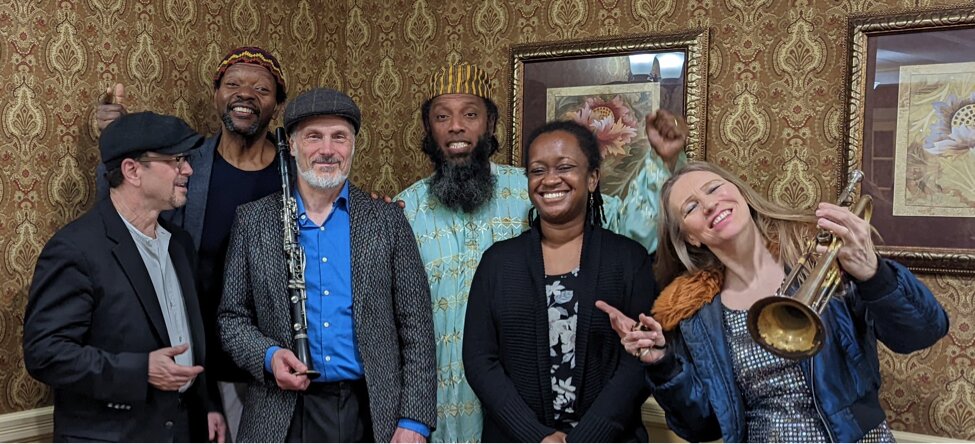Temple Sinai program commemorates MLK, celebrates connections
“So even though we face the difficulties of today and tomorrow, I still have a dream. It is a dream deeply rooted in the American dream. I have a dream that one day this nation will rise up and live out the true meaning of its creed: ‘We hold these truths to be self-evident, that all [people] are created equal.’”
- Excerpt from Martin Luther King Jr.’s “I have a Dream” speech, on Aug. 28, 1963.
These words, famously uttered by Martin Luther King Jr. decades ago, could still be fervently wished for in 2024, not only in our own country but throughout the world.
Who could not still dream about, wish for, pray for, a time when we are able to acknowledge that we – all of us – are b’tzelem Elohim, made in the image of God, and that the God-given right of full equality is, indeed, a self-evident truth?
And yet, not only have these concepts frayed throughout the world, but in our own country, where race relations seem to be at a low ebb.
Throughout the 1960s, Jews and Blacks marched together for equal rights in Selma, Alabama; in Birmingham, Alabama; in Washington, D.C.; and in so many other cities across our nation, often with our rabbis, such as Abraham Joshua Heschel, in the front lines. But now it seems we have witnessed a slow unravelling of the ties that bind Jews and Blacks in the struggle for equality.
Beginning early in the 20th century, at one of the highest points of Ashkenazi immigration to America from eastern Europe and Russia, recently arrived Jewish intellectuals were quick to recognize and characterize the Black experience in the South as pogrom-like. Jewish writers, taking their cues from “Negro spirituals,” reiterated and reinforced the connections between the Black and Jewish experience, from slavery, to exodus, to cries for “homeland” returns.
Many Jews have devoted much of their fortunes, and their lives, to Black causes. Here are just a few: Julius Rosenwald, a Jewish American businessman and philanthropist who generously funded Black colleges; attorney Jack Greenberg, who spent the bulk of his professional career defending civil-rights issues, causes and cases; and Andrew Goodman and Michael Schwerner, who, among others, made the ultimate sacrifice, giving their lives in Mississippi in the fight for civil rights. Like Goodman and Schwerner, Jews were lynched alongside Blacks.
Jewish empathy for the Black experience resulted in a high proportion of Jewish participation in the struggle for racial equality. Even in the arts, Jews expressed their transracial identification in the creation of a number of widely heralded movies, songs and Broadway musicals, from Irving Berlin and George Gershwin to the interconnections of Jazz, klezmer and cantorial singing, to Steven Spielberg.
To be sure, Black-Jewish relations have also been discouragingly complex at times. While the most significant and influential Black philosopher of the early 20th century, W.E.B. Dubois, not infrequently denounced antisemitism in his writings, he also characterized Jews as the inheritors of the “slave-barons.”
Many other esteemed authors, such as James Baldwin, vacillated between deep respect for his Jewish brethren and distrust.
Still, the recognition of shared experience persisted.Today, as the term “Palestinian” is increasingly used by the most radical, anti-Israel faction less as an ethnographic designation and more as a political meme for generalized oppression, Black-Jewish relations are facing, perhaps, their fiercest challenge.
Martin Luther King Jr. commemoration at Temple Sinai
Temple Sinai, 20 Hagen Ave., Cranston, will host a Martin Luther King Jr. commemoration Jan. 19-20, sponsored by The Schreiber Family Fund, that will explore and celebrate the connections between Blacks and Jews.
At Shabbat services on Jan. 19, beginning at 6 p.m., the Rev. Howard Jenkins, of Bethel A.M.E. Church, in Providence, will discuss King’s legacy for 21st-century Blacks and Jews.
On Jan. 20, events will begin at 6:30 p.m. with Havdalah, followed by a free concert by The Afro-Semitic Experience, a heralded band that blends traditional Jewish melodies, gospel, blues and jazz to create a dynamic sound that combines the shared roots and cultural diversity of the Jewish and African-American communities.
The concert will be followed by a festive reception hosted by Temple Sinai and Bethel A.M.E.
The concert is free, but preregistration is required. To register, call Dottie at Temple Sinai at 401-942-8350.
DEBORAH JOHNSON is the cantor at Temple Sinai, in Cranston.








